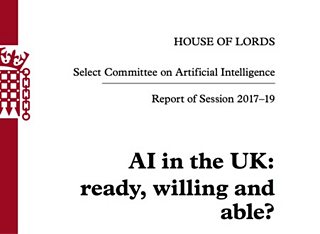AI for common good - a significant moment for AI development
Ali Shah
Emerging Technology and Strategic Direction
"And finally, we have world-respected institutions such as the Βι¶ΉΤΌΕΔ, alongside a long history of international diplomacy, engagement and leadership, which will be necessary if we are to help convene, guide and shape the international debates which need to happen in this area” AI in the UK: ready, willing and able? House of Lords Select Committee on AI Report
The last two weeks has seen a significant shift in the Artificial Intelligence (AI) landscape. For a long time the development of AI has been driven by the technology companies and their priorities; the way AI gets used, and how it impacts the lives of citizens has been subject to their corporate desires. On the whole, this has been a positive journey – in the last few years we have seen breakthroughs in medical diagnosis, mass transport, retail and lots of other fields that have been underpinned by the developments in AI.
But not everything has been a welcome development. We have seen AI used in recidivism cases in the US , there have been , and we have seen r. We might consider that these examples are one offs, with the social outrage when these examples emerge being enough to ensure that these things will never happen again, and perhaps that’s true and good enough. But what if it’s not good enough? Can we leave it to corporations to manage the development of AI? Or do we need corporate, government and public-sector institutions to develop approaches that put the interests of society first?

Well the last few weeks has seen a raft of announcements that start to lay out the strategy for AI, with a, a report by the , an announcement by the European Commission, and a .

It is important to clarify that many of the recommendations and plans don’t stem primarily from a desire to limit the negative consequences of AI, and it’s quite right that they don’t. Rather what unites all the announcements is a positive forward-looking focus around two central tenets. Firstly, that it is in the national and global interest to develop a strategy that supports the development of AI. AI is going to increasingly underpin all aspects of our lives, and it is important that governments invest in AI and create the foundations to ensure AI development and use, can positively support the economy. Secondly, AI has the capacity to dramatically transform our society for the better, and for citizens and society to flourish it is important that the development of AI doesn’t happen in a corporate vacuum. The various strategies that have been announced have recognised that it is imperative that the ethical consequences of AI are also considered, and an environment created that supports human flourishing.

House of Lords debate in Parliament on the 26th of April on the House of Lords Select Committee report on AI which I attended.
A few months ago the UK government announced the creation of three new bodies that would coordinate the development of AI. Their creation shows a recognition of the fine balance needed between a focus on promoting AI for productivity growth, and AI that supported human flourishing and the interests of the citizen and society. Between the UK Office of AI, the AI Council, and the UK Centre of Data Ethics and Innovation, the UK presents tools to support corporations, academia, the public sector and citizens in the development of AI.
However, two things were missing when they were announced. Firstly, the commitment to financial support for the development of AI, and secondly an idea of where to start. The sector deal is designed to provide the financial backbone for the UKs commitment to AI, and the House of Lords recommendations provide a thoughtful and well researched set of recommendations. Lord Clement-Jones – the chair of the House of Lords committee that investigated AI, and the primary author of the report – outlined 5 major themes from within which the recommendations emerged. These are:
- UK leadership in the development and use of AI
- Inclusion and diversity
- Equipping people for the future
- Data
- Ethical framework for AI
The House of Lords report also called out the Βι¶ΉΤΌΕΔ’s contributions to the development of AI, and recognised the Βι¶ΉΤΌΕΔ as one of the national institutions that can help shape AI in the interests of society.
‘’And finally, we have world-respected institutions such as the Βι¶ΉΤΌΕΔ, alongside a long history of international diplomacy, engagement and leadership, which will be necessary if we are to help convene, guide and shape the international debates which need to happen in this area”
The report also references the Βι¶ΉΤΌΕΔ’s written response that was provided to the Lords committee when it was gathering evidence on AI. If you would like to read what we said in full then , but in brief we outlined to the Lords that the positive transformational potential of AI risked being squandered if due care and consideration wasn’t given to the ethical challenges that can emerge from the development and use of AI. The sorts of issues I highlighted at the beginning of the article are not due to any intentional desire to hurt, offend or prejudice, but as a result of unintended consequences from ill-considered application of AI. We concluded that AI will deliver significant benefits to society, but that those benefits risk not being shared equally, and already marginalised communities risk becoming even more marginalised and disproportionally affected. In our response, we also outlined our commitment as follows:
- Firstly, to continue to inform the debate through our editorial output – it is essential that each and every citizen is informed about the developments of AI, and can make informed judgements about its use for themselves
- Secondly, to develop the Βι¶ΉΤΌΕΔ’s own AI in a responsible way – ensuring the use of AI at the Βι¶ΉΤΌΕΔ is aligned to our values, principle and editorial guidelines – we believe our editorial framework provides a great starting position for this
- Finally, by bringing partners together to convene the debate – we believe it is necessary to bring like-minded partners (and those with differing opinions!) together to ensure the tough questions get asked when it comes to the use of AI. We have contributed to conferences and symposia, and have held our own conference on this topic last year, and will be hosting another one later this year.
These are exciting times – the announcements made in the last few weeks mark a moment where government, industry, academia and the public sector can come together to create the environment needed that allows AI development to flourish. As an engineer, it is great to be involved at a point in history where AI is taking its next leap forward – what is even more exciting is to see how AI is starting to transform society. Our collective role is to ensure this impact is positive for everyone.
